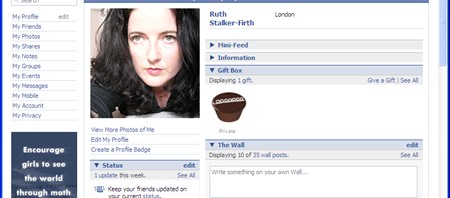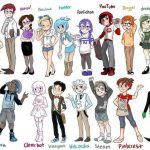I created my first webpage in 1995, which has since disappeared forever as even www.archive.org thinks it’s too old to store. Fingers poised over my keyboard, I felt shy about what to write. Eventually, I restricted myself to my research interests as I didn’t think that anyone would care to know about my favourite beer. How times have changed. The web nowadays is full of people talking about their favourite beers (mine, by the way, are Theakston’s Old Peculiar and Franziskaner). Everyone likes to chat.
Recently, I upset someone when I told her that I had googled her, just after meeting her. For me, googling is the most natural thing in the world. When I hear about something or if someone asks me a question my instant response is to look it up online. So when this person behaved as if I had said, “I like to stand outside your house on an evening.” I was rather surprised and got to thinking about stalkers.
I am, of course, by name a stalker. Growing up though, no one could spell my surname. It was constantly recorded as Stawker, Storker, Stacker and if I was really unlucky, Starkers. Yet surely stalking behaviour existed? I remember a school teacher explaining to 13 year-old me that he was tired because he had driven 150 miles the previous night to sit outside the house of an ex-pupil on the off chance of catching a glimpse. Was this an instance of stalking? I guess it depends on the perception of the object of his affections. And since he was just lurking, was he not rather a lurker rather than a stalker? Nowadays when I say my name people immediately know how to spell it and, if I am really lucky, crack a joke about it *sigh*. My stock reply is inspired by my cyber behaviour so I say that I am more of a lurker than a stalker.
In the world of Web 2.0 my poor old schoolteacher, God love him, wouldn’t have to leave his house. Friendsreunited and Facebook are perfect ways to see what someone is or has been up to. Facebook is the worst. Up pops a mini-feed everytime you log on repeating bits from other peoples communications. Clearly in your face with who has been organising nights out without you. Friendsreunited is less aggressive because of its asynchronous nature i.e. it is more a place to read about people you used to know. Rather like when your mum bumps into one of your old mate’s mum and they exchange information, but more accurate because your old mate is preparing the information firsthand and it doesn’t get mangled via the mumvine.
These behaviours aren’t new of course as much as everyone cries Web 2.0. Mums have been exchanging information since Eve and Facebook is based on American college face books that are handed out at the beginning of a new academic year. Mailing lists and on-line games have been around for ages but only for those who were into a specific subject such as OpenGL or role playing games such as MOOM. Later incarnations were the sixdegrees site, I remember fiddling about on there too – not knowing all those people. Is it the ‘critical mass’ which has made these sites popular? Alan Dix says in his HCI book:
When telephones were only in public places, their use as a form of pervasive interpersonal communication was limited. However, once a large number of people have telephones in their homes it becomes worthwhile paying to have a telephone installed. In cost/benefit terms, the early subscribers probably have a smaller benefit than the cost. Only when the number of subscribers increases beyond the critical mass does the benefit for all dominate the cost. The situation for conferencing systems and email is, of course, very similar.
Apparently though, Web 2.0 is epitomised by virtual communities such as Facebook and Flickr. However, I don’t feel like I am part of a community just because I can flick through friends and strangers photos on Flickr – apparently common behaviour – or read what other people are up to on Facebook. Both activities seems slightly voyeuristic – a bit like standing outside someone’s house on an evening. Perhaps Juliet was wrong when she said, ‘What’s in a name?’ Perhaps a stalker wouldn’t behave the same with any other.
Related Posts
Visits: 1153







2 comments